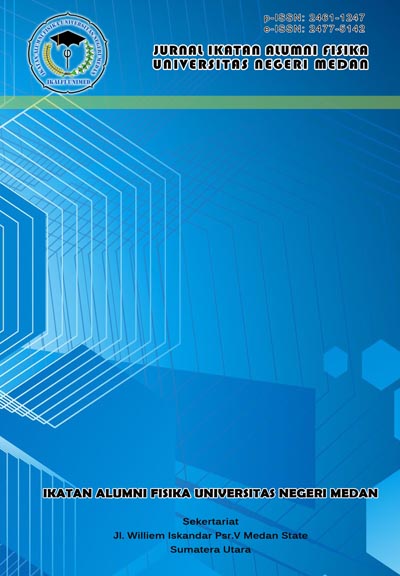STRATEGI PEMBELAJARAN BERBASIS MASALAH UNTUK MENINGKATKAN KOMPETENSI DASAR FISIKA SISWA KELAS VIII SMP AMIR HAMZAH MEDAN
DOI:
https://doi.org/10.24114/jiaf.v3i2.7776Keywords:
pembelajaran berbasis masalah, kompetensi dasar Fisika, aktivitasAbstract
Penelitian ini dilaksanakan dengan tujuan meningkatkan kompetensi dasar Fisika dan aktivitas siswa SMP, melalui penerapan strategi pembelajaran berbasis masalah. Penelitian tindakan kelas ini dilaksanakan dalam dua siklus pembelajaran, melibatkan 40 orang siswa kelas VIII “ 1 SMP Amir Hamzah Medan. Kompetensi dasar Fisika yang disasar meliputi aspek kognitif, psikomotor dan afektif. Data tentang kompetensi kognitif dikumpulkan dengan metode tes, menggunakan pemahaman konsep, data tentang kompetensi psikomotor dan kualitas aktivitas pembelajaran siswa dikumpulkan dengan metode observasi menggunakan pedoman observasi, sedangkan data tentang kompetensi afektif siswa dikumpulkan dengan metode kuesioner menggunakan angket. Semua data penelitian kemudian dianalisis secara deskriptif dengan menentukan rererata masing-masing data dan dijustifikasi pada masing-masing indikator. Hasil analisis data menunjukkan bahwa kompetensi dasar Fisika siswa dapat ditingkatkan.References
Barbara. J. Duch. Deborah E. allen and Harold B. White, III.2002. Problem-based learning : preparing student succed in the 21 st century. University of Dalaware. http://www.podnetwork.org
Boud, D. and Feletti, G. 1997. The challenge of problem based learning. London. Kogan
Barrows Howard. 1996. New Direction for Teaching and Learning œProblem-Based Learningin Medichine and Beyond; Abrief Overview . Jossey Bass Publishers
Davis, P. R. Intregrating a problem-based learning approach into undergraduate teaching. Departement of Construcction and Planning. pdavis@arch.curtin.edu.au
Depdiknas. 2004. Standar kompetensi mata pelajaran sains. Jakarta: Dirjen Pendidikan.
Dorothy L. Gabel. 1994. Handbook Of Research On Science Teaching and Learning (A Project of the National Science Teachers Association). Macmillan Publishing Company. New York.
Gallagher et al. 1995. Shool Science and Mathematics œImplementing Problem-based Learning in Science Classrooms Chicago Academy of Science.
Heller,P. et al. 1992. Teaching Problem Solving Through Copertaive grouping Part 1: Group Versus individual Problem Solving. American Journal physics . July 1992 (627 “ 636).
.............. 1992. Teaching Problem Solving Through Copertaive grouping Part 2: Designing Problem and Structuring Groups. American Journal physics . July 1992 (637 “ 644).
Ibrahim, M dan Nur, M. 2000. Pengajaran berdasarkan masalah. Surabaya;UNESA-University Press Surabaya.
Ibrahim, M dan Nur, M. 2004. Pengajaran berdasarkan masalah. Surabaya;UNESA-University Press Surabaya.
Santyasa I. W. 2003. Assesmen Dan Kriteria Penilaian Hasil Belajar Fisika Berbasis Kompetensi. Makalah Disajikan Dalam Semlok Bidang Peningkatan Relevansi Progrm DUE-Like Jurusan Pendidikan Fisika IKIP Negeri Singaraja.
Savoie J M. & Andrew S H, 1994. œ Problem-Based Learning As Classroom Solution Educational Leadership
Stepien W & Gallagher S. 1993. œ Problem-Based Learning As Authentic at It Gets Educational Leadership
Suparno, P. 1997. Filsafat konstruktivisme dalam pembelajaran. Yogyakarta. Kanisius.
Downloads
Published
Issue
Section
License
Copyright (c) 2017 JURNAL IKATAN ALUMNI FISIKA

This work is licensed under a Creative Commons Attribution 4.0 International License.
Authors who publish with this journal agree to the following terms:- Authors retain copyright and grant the journal right of first publication with the work simultaneously licensed under a Creative Commons Attribution License that allows others to share the work with an acknowledgement of the work's authorship and initial publication in this journal.
- Authors are able to enter into separate, additional contractual arrangements for the non-exclusive distribution of the journal's published version of the work (e.g., post it to an institutional repository or publish it in a book), with an acknowledgement of its initial publication in this journal.
- Authors are permitted and encouraged to post their work online (e.g., in institutional repositories or on their website) prior to and during the submission process, as it can lead to productive exchanges, as well as earlier and greater citation of published work (See The Effect of Open Access).

